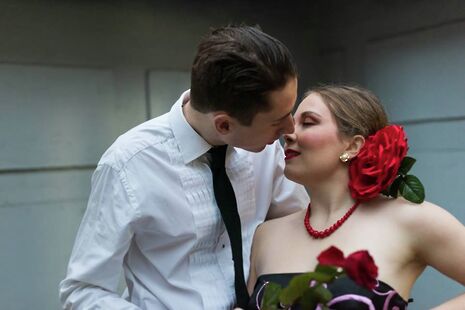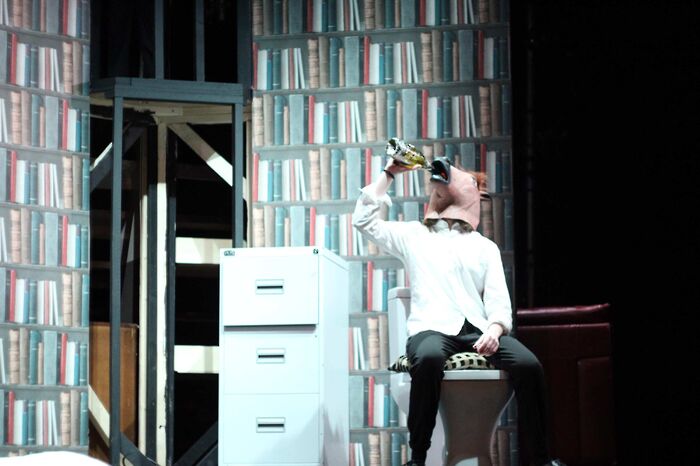Carmen preview
CUOS’ main show will bring “a new lease of life” and rich character depth to this iconic Bizet opera

Bizet’s Carmen is one of the most popular operas in the canon, and I’ve definitely found myself whistling the 'Toreador' song as I do my laundry, so I was excited to talk to Eleanor Burke (director) about CUOS’ upcoming main show at West Road Concert Hall and hear about her vision beyond the recognisable tunes. By revolutionising the setting and bringing the story into 1980s Seville, Burke hopes to inject originality and excitement into this classic opera with her talented team of cast and creatives, including a full orchestra.
This is one of the most performed operas universally, and with good reason, Musical Director Oliver Cope tells me: ‘the music is as seductive as Carmen herself!’. Bizet’s world-famous tunes will be tripping around your head for weeks, but this is a production which is keen to re-focus on some of the more tender and touching moments of the opera. Escamillo’s 'Toreador' aria and Carmen’s 'Habanera' are complemented by moments of extreme sincerity.
Burke tells me that she is also keen to create a Carmen who is more than just the femme fatale trope, and mezzo-soprano Chloë Allison (Carmen) agrees. Carmen is, at different moments, vulnerable and mistreated, passionate and charismatic, provocative and independent, which, as Allison puts in, gives her an ‘intoxicating magnetism’ as a character. This is one of the most challenging roles in the operatic canon, not just in technical skill but also in crafting a character which defies stereotype.
I wonder, then, if Burke and Cope feel that such a young cast can rise to the challenge of such a complex and musically exciting performance. But the two view their energetic young principles and chorus as a real asset to the production: ‘it’s really led to fantastic energy in the rehearsal room and made the concept very easy to relay as 1980s Seville, recently liberated from the oppression of Franco, was a time when it was both exciting and uncertain to be young’, Burke tells me. By bringing the production into twentieth-century Spain, Burke hopes to bring a new lease of life to the opera, as well as to draw attention to the perennial issues facing women who refuse to be cowed by societal pressure.
"Rehearsals have been intensive and character-based."
What has the biggest challenge of working on this production been? Burke takes me back to the problem of stereotype: the story is so famous that the real challenge has been ‘unpicking, but not necessarily undermining the traditional perspectives of these characters.’ To that end, rehearsals have been intensive and character-based – apparently, Burke spent half an hour on three bars of interjection in Anna Wagner’s (Micaela) part, nailing the portrayal of complicated and fully realised characters. It’s also tempting to turn this into a tale of star-crossed lovers like those so popular at the time of Carmen’s conception 150 years ago, but Burke is keen to remind her audience that Bizet’s opera ‘is no Fairy Tale’. From what I have seen of rehearsals, this dedication to nuance and complexity in characters has absolutely paid off: the performances are as thought-provoking and subtle as they are powerful and technically skilled.
With over 150 people involved in bringing this production to life at West Road, Carmen promises to be colourful and spectacular, crafted and performed by some of the most talented creatives in Cambridge. Opera can have a reputation as being inaccessible and pretentious, but Burke, Cope and their team are determined that this fully-subtitled production will do something to change that reputation by thrusting this passionate and tender tale into a vivacious new setting with a brilliant and energetic young cast.
 News / Clare Hall spent over £500k opposing busway 24 December 2025
News / Clare Hall spent over £500k opposing busway 24 December 2025 Comment / The ‘class’ of Cambridge24 December 2025
Comment / The ‘class’ of Cambridge24 December 2025 News / Caius mourns its tree-mendous loss23 December 2025
News / Caius mourns its tree-mendous loss23 December 2025 News / Girton JCR publishes open letter expressing solidarity with Palestine25 December 2025
News / Girton JCR publishes open letter expressing solidarity with Palestine25 December 2025 Comment / Yes, I’m brown – but I have more important things to say22 December 2025
Comment / Yes, I’m brown – but I have more important things to say22 December 2025










